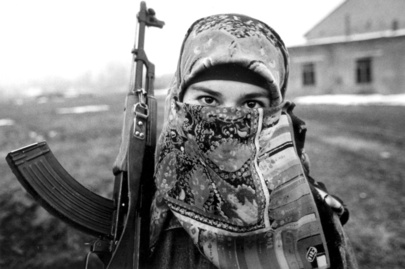
BY CAROLINE WRAY:
It began at the turn of the millennium, when 17-year-old Khava Barayeva appeared at a military base and blew herself up. Since then, 47 female Russian suicide bombers have killed nearly 200 people and wounded hundreds more. The media has labeled these women “Black Widows,” referring to what seems to be a thread of bombers who are widows of insurgent husbands.
Many of these women are members of groups that are rooted in Dagestan, the predominantly Muslim, southernmost region of Russia. The region is plagued with religious and political turmoil, complete with bombings that seem to occur almost daily. The turmoil comes as a result of a roughly 15-year insurgence of the radical Islamic sector Salafism. Within the sector lie extremist terrorist groups who recruit these female bombers, or shahidka.

These and many other Islamic militant groups are run under “Russia’s Osama Bin Laden,” Dokka Umarov. In a particular recent threat, Umarov has warned that suicide bombings should be occurring during the 2014 Sochi Winter Olympics, which he promises to ruin.
In response to this danger, the crackdown on Dagestan and suspected militants has been severe. “Preeminent” attacks by officials have augmented the violence in what is already a volatile region.
Speculation about what causes these “Black Widows” to do just what they do abounds. The media has generally oversimplified their cause by attributing it to heartbreak at the death of a beloved son or father. Although this is often the case, it is not universally so, and the life of a woman in this region needs to be examined all the more closely in order to further understand.
The marriages that these women face are a far cry from the traditional Western marriage. They frequently marry as teenagers in arranged marriages or even “bride kidnappings.” The culture of centuries has told these women to suppress sexual desire or frustration, and to be dutiful no matter what. These women are oppressed and isolated, lonely and forcibly silenced. Terrorist groups, such as the Riyad us-Saliheyn Martyrs Brigade, a Chechen group dedicated to a new founding of an independent Islamic Chechnya, provide a sense of fellowship and false empowerment. Journalist and author of Brides of Allah Yulia Yuzik reflects on this:
“The first thing that these people received upon entering the collective was love. They were called brothers and sisters, they were coddled, food was prepared for them, prayers were read with them, much time was spent in conversation with them.”
The friendship leads to a suggestion of strength: who is strong enough to sacrifice herself for Allah? Who has that kind of power within her? There are few other outlets for these women, after all. And tragedy is seared into their lives, as so many of their sons and husbands have either killed themselves or been killed by the Russian military; one article from the Daily Beast said that many of these shahidka are widowed two or even three times before their 25th birthday. This tragedy leads to an inevitable sense of hopelessness amplified by intense brainwashing, blatant drugging, and the steadily increasing fear of total alienation in the event that a woman refuses to carry the bomb or leaves the group.
Thousands upon thousands of husbands and brothers and sons and fathers have been killed as a result of involvement with Islamic militant groups. It shouldn’t be a surprise that their wives and sisters and mothers are getting involved.
Caroline Wray ‘17 is in Jonathan Edwards College. She is a Globalist Notebook blogger on Russia. Contact her at caroline.wray@yale.edu.